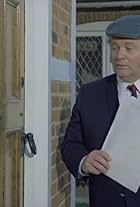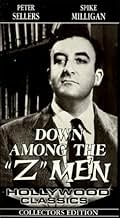Harry Secombe(1921-2001)
- Actor
- Writer
- Music Department
Harry Secombe was one of Britain's best loved comic entertainers. Born
in Swansea, South Wales he began singing as a child in local church
choirs. His first job was as a clerk although he had considered a
career in opera. During World War Two he served in the Army in North
Africa and Italy. He met the comedian Spike Milligan while on duty in
the Western desert and their common bond was a unique brand of humour.
Secombe appeared in many troop concerts where he was known for his
trademark high pitched laugh and blowing raspberries. After the war he
appeared as a comic at London's famous Windmill Theatre and in 1945
became one of the stalwarts of the hugely successful radio series
Educating Archie. His greatest popularity began in 1951 with the birth
of radio's Crazy People, later to be renamed The Goon Show. One of the
most famous radio comedy programmes of all time it helped launch the
careers of Secombe, Spike Milligan, Peter Sellers and Michael Bentine.
Whilst the Goon Show was in its prime the comedy team made several films associated with the series including Down Among the Z Men (1952) and in 1955 Secombe had his own TV show, The Harry Secombe Show. His other popular TV shows, often written by Marty Feldman and Barry Cryer, included Secombe and Friends (1966) and Have a Harry Christmas (1977). On stage he had a long running success with Leslie Bricusse's Pickwick (1963) and he revived the show in the 1980s.
His most notable film work began with Davy (1957) in which he played a music hall performer who auditions for an opera at Convent Garden. It was meant as a star vehicle for him but was not a box office success. International audiences became familiar with him when he played Mr Bumble, the beadle in Oliver! (1968) and films such as The Magnificent Seven Deadly Sins (1971) and Starstruck (1972).
Knighted in 1981 and much slimmed down after a serious attack of peritonitis, he continued to appear in concerts and on television as well as writing several volumes of autobiography. He toured Australia and in 1983 became the host of Highway, a weekly TV religious programme. This was Secombe toned down, far from his rollicking past and with no jokes, but it gave him a chance to sing seriously. The show ran for nearly ten years.
Ill health continually dogged the comedian in his final years and he battled with cancer and a severe stroke. He continued to appear on television, notably narrating D Day - The Official Story (1994) and presenting Top Ten Comedy Records (2000).
Whilst the Goon Show was in its prime the comedy team made several films associated with the series including Down Among the Z Men (1952) and in 1955 Secombe had his own TV show, The Harry Secombe Show. His other popular TV shows, often written by Marty Feldman and Barry Cryer, included Secombe and Friends (1966) and Have a Harry Christmas (1977). On stage he had a long running success with Leslie Bricusse's Pickwick (1963) and he revived the show in the 1980s.
His most notable film work began with Davy (1957) in which he played a music hall performer who auditions for an opera at Convent Garden. It was meant as a star vehicle for him but was not a box office success. International audiences became familiar with him when he played Mr Bumble, the beadle in Oliver! (1968) and films such as The Magnificent Seven Deadly Sins (1971) and Starstruck (1972).
Knighted in 1981 and much slimmed down after a serious attack of peritonitis, he continued to appear in concerts and on television as well as writing several volumes of autobiography. He toured Australia and in 1983 became the host of Highway, a weekly TV religious programme. This was Secombe toned down, far from his rollicking past and with no jokes, but it gave him a chance to sing seriously. The show ran for nearly ten years.
Ill health continually dogged the comedian in his final years and he battled with cancer and a severe stroke. He continued to appear on television, notably narrating D Day - The Official Story (1994) and presenting Top Ten Comedy Records (2000).






















